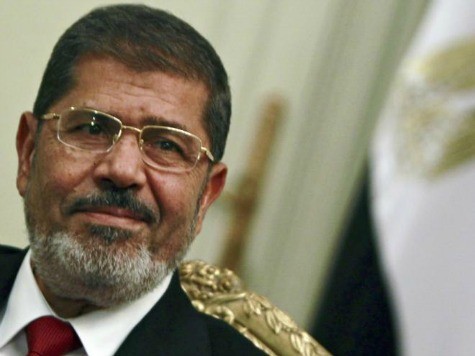
Time magazine named “TheProtester” its Person of the Year 2011, inspired by demonstrators in both the Arab Spring and the Occupy Wall Street movement. But the power grab in Egypt last week by Mohammed Morsi highlights just how naïve the media was toward the Arab Spring.
Last December, Time magazine tapped Kurt Andersen to write a grab-bag Person of the Year cover story praising the Arab Spring and the Occupy movement under the generic heading “The Protester.” The conflation was always a bad idea as the repression in Tunisia, Egypt and elsewhere was always categorically different than the self-imposed homelessness of Occupy protesters.
Nevertheless, Andersen attempted to gloss over the differences with sentences like this one: “instead of plugging in the headphones, entering an Internet-inducedfugue state and quietly giving in to hopelessness, they used theInternet to find one another and take to the streets to insist onfairness and (in the Arab world) freedom.” The distinction highlighted by that needed parenthetical should have been the story instead of what amounted to a sidebar.
But getting stuck with a flawed concept wasn’t the only problem with the Person of the Year piece. Another was Andersen’s tone-deaf claims about the prospects of the Muslim Brotherhood in Egypt. He referred to Islamists who took over Egypt’s parliament as “sweet talking moderates who secularists worry won’t stay that way.” He then offered his own opinion, comparing the Brotherhood favorably to American Evangelicals:
To me, the mainstream Islamist parties in Egypt and Tunisia don’t appearmuch more fanatically religious than, say, Pat Robertson-esqueEvangelicals in the U.S., and unlike the Republican hard-liners, theysound committed to a national consensus that includes secular liberals.
That assessment doesn’t look so good in light of President Morsi’s announcement Friday that the “constitutional declarations, decisions and laws issued by thepresident are final and not subject to appeal.” The concerns of secularists which Time brushed off as unfounded turn out to be completely justified.
Time magazine wasn’t alone. The Nation also assured readers last year that the Muslim Brotherhood was “one of the tamer and more moderate alternatives within the Islamist movement.” That may be so, but it’s not clear why it matters. No one was arguing that the Brotherhood was the most extreme option. The question that mattered was whether the Brotherhood was too extreme to handle power.
The New York Times‘ Nick Kristof wrote a column attempting to sooth nervous liberals about the Brotherhood’s goals. The young woman who was his interview subject assured readers, “We embrace moderate Islam,” adding, “We are not the ultra-conservatives that people in the West envision.” Kristof concluded, much as Andersen had, that “a bit of nervousness is fine, but let’s not overdo the hand-wringing — or lose perspective.” Is it time to hand-wring yet?
Attempts to spin the Muslim Brotherhood into a trustworthy, secular organization weren’t confined to the media. The Obama administration’s Director of National Intelligence James Clapper described them during a Capitol Hill hearing as “a very heterogeneous group, largely secular.” A DNI spokesman corrected Clapper later the same day, saying, “He is well aware that the Muslim Brotherhood is not a secular organization.”
But the promised secular Brotherhood (less religious than Pat Roberson-esque evangelicals!) merely waited for the right moment to announce Sharia would be the basis of the new Egyptian Constitution. It’s not clear what the Brotherhood’s vision of a Sharia that respects secular rights would look like exactly, but this move should not have been a surprise to anyone.
There is a bright line between being a moderate Islamist in the Middle East and being a proponent of secular democracy. While writers for Time and the NY Times may have had trouble discerning it clearly last fall, it has become impossible to miss a year later.

COMMENTS
Please let us know if you're having issues with commenting.